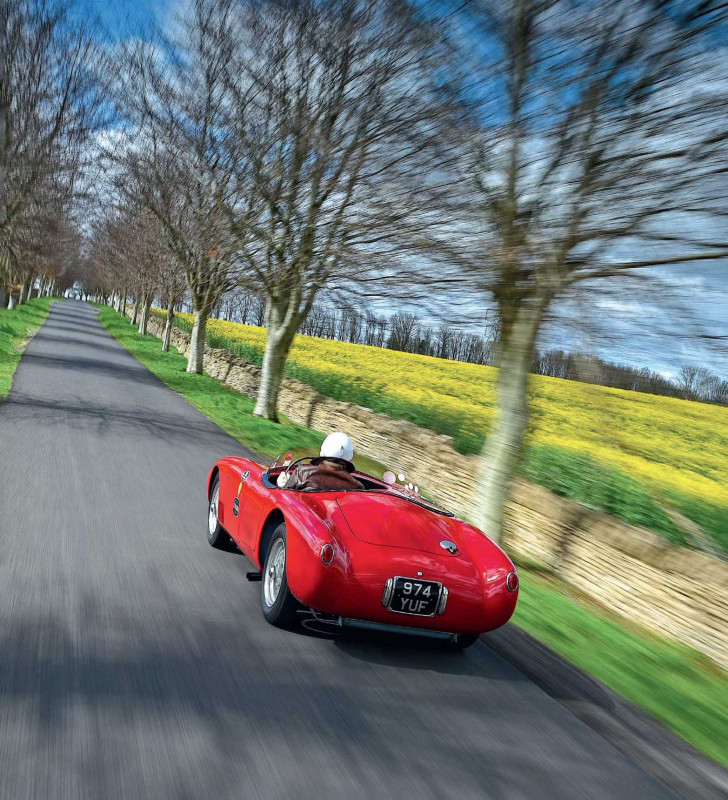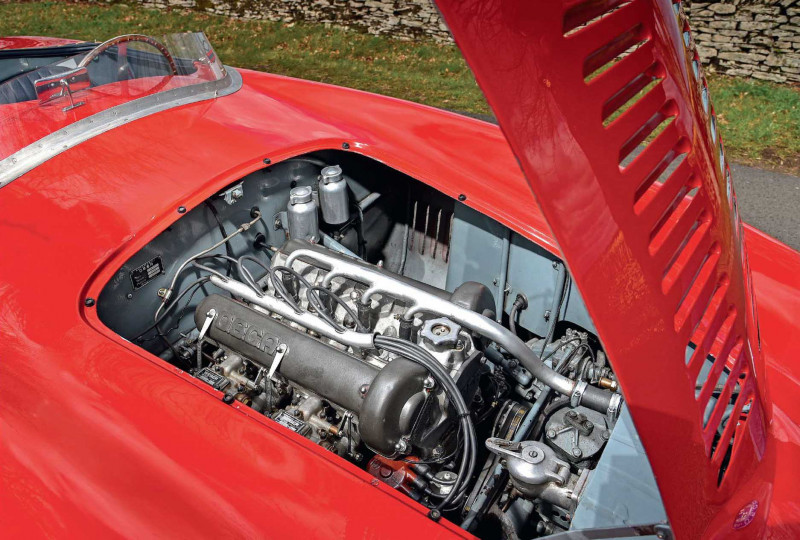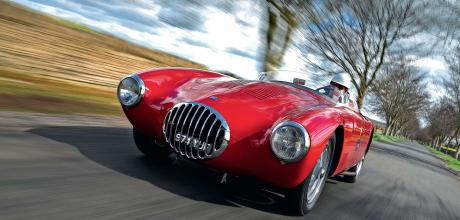1954 OSCA Tipo MT4-2AD
With an incredible history in some of the world’s greatest road races, this tiny Osca MT4 is ready to take on its next competitive challenge.
WORDS MICK WALSH
PHOTOGRAPHY WILL WILLIAMS
LITTLE RED ROADSTER
FLAT-OUT IN A GIANT-KILLING OSCA RACER
MASERATI IN MINIATURE
Mick Walsh hits the road in the brilliant little Osca MT4, a giant-killing sports-racer
Everyone loves a giant-killer, an underdog who trounces the big guns. The Osca MT4 was just such a junior sportsracer, the creation of the Maserati brothers after they had sold their eponymous first business to the Orsi family. Most famous of this little barchetta’s impressive victories was not around the sinuous mountain roads of Sicily, but pounding the desolate flatlands of Florida in 1954 for the third 12 Hours of Sebring.

“It was a steep learning curve, and just as we made the finish the clutch failed; locals cheered us on as we pushed it over the line”
The twin-cam, 1452cc Latin compact was entered by the dashing American millionaire sportsman Briggs Cunningham, with his son-in-law Bill Lloyd teamed up with young British ace Stirling Moss, who jumped at the chance of escaping austere England for the sunny warmth of the American south. Against an international 60-car field, including factory-team Aston Martins and Lancias plus a clutch of privateer Ferraris, the little white MT4 was never judged to be a contender. Moss always relished such a situation, and was determined to prove the pundits wrong with this jewel from Bologna.

“Briggs’ Osca was quite amazing,” the maestro told historian Doug Nye. “You could drive it as hard as you liked, slinging it sideways was no trouble.” In his diary, Moss recorded that the Osca was: ‘A little beauty – 5900 in top and 5600 in gears.’ Only insufficient brakes and a weak clutch spoiled the MT4’s potential, but the brilliant handling continually delighted Moss.
As expected, the Lancia D24s set the pace at Sebring, duelling away out in front, but after four hours of racing, Moss and Lloyd were up to seventh – despite a spin. And when the Lancias began to suffer mechanical problems, the tiny Osca rasped into the Florida twilight. With the chilly darkness enveloping the circuit, it steadily climbed the leaderboard to an amazing second as the race entered the final nocturnal hour. By now totally without brakes, Moss delighted the 14,000-strong crowd as he slid into the turns broadside to scrub off speed.
No one expected Moss to catch the leading 160mph Lancia, which was five laps ahead when Piero Taruffi went missing, his D24 left stranded out on the circuit with a silent engine. The ‘Silver Fox’ gallantly tried to push the 3.3-litre V6 exotic down the long straight back to the pits, with the flashbulbs of photographers and lights of an official’s car illuminating his route. The engine had seized and the Moss/Lloyd Osca took the lead, but the drama wasn’t over as Luigi ‘Gino’ Valenzano gave chase in another D24. Despite a brake pedal that went to the floor and a broken clutch, Moss kept his cool and jubilantly claimed one of the biggest upsets in endurance sports-racing history. It was a great day for Osca, with three MT4s in the top five and dominating the Index of Performance as well as taking the overall victory. Moss and Lloyd averaged 72mph for 873 miles over the weathered and cracked surface of the five-mile airfield layout, where once B-17 bombers had rumbled.
To prove that it was no fluke performance, the MT4 was back at Sebring for the 1955 12 Hours and, with Lloyd now alongside George Huntoon, it still finished an impressive seventh among an 80-car field – just behind Moss’ 2.7-litre Austin-Healey 100S. Today that famous two-owner Osca, chassis 1137, is still in Florida as one of the stars of the Revs Institute museum. ‘It was a little gem, a superb little sports car,’ concluded Moss in My Cars, My Career, and many years later he bought himself an Osca 1500S for historic racing.
The story of the British hero’s epic Sebring drive has captivated me since childhood, and I’ve long wanted to sample the charms of this ’50s twin-cam junior sportsracer. When new, they were rare and too expensive in England, while in historic racing they are unsuited to 10-lap sprints against the dominant Jaguar-powered machines. The Mayman family raced an early two-tone MT4 in the 1980s, but it was the revival of the Mille Miglia that really raised interest in these Bologna-built beauties. Italian-car enthusiast Alexander Fyshe had always wanted a Maserati built by the founding brothers. So when an MT4 with a fascinating racing history was consigned by auction house Brooks for its Olympia sale in 1997, the London-based character – best known for his bizarre stars-and-stripes trousers – and former Maserati Club UK president bought himself an early Christmas present. Fyshe was also keen to experience the Mille Miglia retrospective and the Osca seemed the perfect choice.
Hidden away for 20 years in Sicily, this little-seen MT4-2AD (the additional designation referring to the twin-cam version of the Fiat-derived engine introduced in 1950) boasted an enviable record including three sorties on the epic Italian road race – 1954, ’56 and ’57 – which pretty much guaranteed an entry in the modern rerun. Chassis 1143 was completed in April 1954 and, with an 1092cc engine fitted, it was entered by owner Francesco Giardini on the Mille Miglia, but the MT4 was forced to retire when the differential cried enough. Later, with a 1490cc twin-plug ‘Tipo Nuevo’ engine, it was entered at Le Mans in June by the works for Giardini, teamed with Jacques Péron. Wearing number 42, the little red racer was dominating its class and running seventh overall, 15 laps clear of its nearest Porsche rivals, when it pulled in for a final pitstop in the 23rd hour.
Story has it that Giardini got a bit too excited about his position and overdrove during the final stint until, at Mulsanne corner, he lost control and the Osca overturned into retirement. After these two initial disappointments, however, the bodywork was quickly repaired and Giardini proved dominant in a wide range of Italian events throughout the 1954 season, with outright victories at Pergusa and in the Six Hours of Castelfusano in Rome. Around the spectacular mountain roads of the Coppa d’Oro delle Dolomiti, Giardini gunned the robust roadster to second place overall. To fund a Maserati A6GCS, Giardini sold the MT4 to Attilio Brandi of Florence, who continued its racing life with some laudable performances including a class win in the tough Giro di Sicilia. In 1956, back in original 1092cc form, the two-year-old Osca finally completed the Mille Migila. In an astonishing feat of endurance, Brandi raced solo from the Brescia starting ramp in the dark – his number 404 meant a 4:04am start time – to Rome and back in 14 hrs 48 mins to claim the 1100cc class victory.
Chassis 1143 continued to be campaigned for the following seven years, including on the Targa Florio in 1958 and ’61, before it was acquired by Sicilian artist Mario Raimondo. Better known as ‘Barbadirame’, this Palermo-based painter and sculptor was a close friend of Pablo Picasso and an amateur racer who entered the gruelling Sicilian road race. Co-driving with Checco d’Angelo and pitched in with the greatest aces around the 72km Circuito Piccolo delle Madonie, the artist lasted seven of 10 laps before retiring. The Osca was then laid up on the Mediterranean island until the 1980s, when it was discovered and sent to marque specialist Autofficina Sauro for body restoration.
Upon unearthing the Osca’s remarkable history in all of the great European road races, Fyshe was ecstatic about his new acquisition and immediately entered it in the 1998 Mille Miglia. The daunting task of rebuilding the MT4, which hadn’t run for decades, in just three months fell to McGrath Maserati – a challenge that workshop manager Andy Heywood will never forget. “It’s a miniature Maserati and one of my favourite cars,” says Heywood. “I went to the auction and I remember Alex telling everyone how awful the Osca was. Two weeks later it turned up at our workshop with instructions to prepare it for the Mille Miglia! We already looked after his Fiat-Osca 1600S Fissore Coupé, but the MT4 was a very different machine.”
Fresh from cosmetic work in Italy, the Osca looked very presentable but required a total mechanical stripdown. “Alex didn’t want us to rebuild the engine because he thought the Mille Miglia deadline would pass,” recalls Heywood.
“It had good oil pressure, and gave about 90bhp in the most basic MT4 spec with very peaky performance.” The Hertfordshire-based team set to rebuilding the suspension – independent up front, by forged wishbones and coils, with a live rear axle – and the drum brakes, as well as making missing details such as the undertrays. “Alex and I went to Franco Lombardi’s Genova Autostory event, which coincidently featured a special Osca display,” recalls Heywood. “It was a memorable trip where I met Alfieri Maserati and historian Luigi Orsini. I made lots of notes from a very original MT4 that was on display, and we found some parts in the autojumble including a pair of brake-fluid reservoirs.”
In the final two weeks before the May event, Heywood and team worked until 10pm every night to get the Osca finished: “Around my local ‘Targa Hitchin’ testing course the car was great fun, but with the hard suspension you had to watch out for potholes. The gearbox was the only failing, and I never understood why it only had synchromesh on third and fourth.”
In engineering detail the Osca is a toolroom design built with immense pride in the style of the early post-war Maseratis: “Features such as the water pump running off the back of the dynamo shaft, the quarter-elliptic rear springs and the brass bushes of the front wishbones are typical of the early A6-1500 models.”
As support crew, the McGrath team had an eventful first Mille Miglia chasing the little Osca to Rome and back over those legendary roads: “The weather was very wet and it was a steep learning curve, then just as we made the Brescia finish the clutch failed. The locals cheered us on as we pushed it across the line. With cigarette in hand, a euphoric Alex announced that it was the drive of his life. There’s no weather protection, and it was tiring with lots of noise from the side exhaust, but Alex never invited his navigator to drive.”
Fyshe adored the little Osca and took it back to three former historic venues. As well as tackling the Mille Miglia seven times, he drove it to Le Mans for a few parade laps before the 24 Hours, and revisited Sicily for a rerun of the Targa Florio. Fyshe reluctantly sold the MT4 in 2013 after 16 unforgettable years, but it successfully completed the Mille Miglia again in 2014, this time with an all-female crew.
The narrow Cotswolds route chosen for our test on a fresh spring morning couldn’t contrast more with the baking heat of the Sicilian mountains or a long, wet night around La Sarthe, but the Osca’s character soon shines through. The compact cockpit and superbly supportive, leather-trimmed bucket seats are snug for me, but at speed anyone taller would be constantly having to duck down out of the relentless airstream. When driven solo, this MT4 was fitted with a higher single ’screen for Le Mans that would help with wind protection, but it would have taken a plucky pilot to hunker down along the Mulsanne straight in 1954, with Ferrari 375 Plus or Jaguar D-type blasting past and blinding you with a wash of spray.
The interior details are purposefully minimal with just three instruments: a Jaeger rev counter marked to 10,000rpm, plus oil-pressure and water-temperature gauges. After pushing in the clockwork-toy-like ignition key, and fumbling under the dash for the starter lever, the hearty little ‘four’ barks into life with an eager rasp. The lack of synchromesh on first and second gears makes low-speed changes a pain (one MT4 owner fitted a Toyota five-speed gearbox in frustration), but singing along in the higher ratios, the change through the tight gate is super-slick. Once you are familiar with the gears, the lively motor loves to rev, with a fervent range that gives surprisingly energetic torque.
The worm-and-sector steering is a total delight, too, its light action both fast and precise, and offering inspiring feel. With a clearer route, extending the MT4’s potential is a joy thanks to the chassis balance and its taut character. Pushed harder through the bends the tail feels a little light, but with a full tank of fuel and a spare wheel fitted, the weight distribution would make better use of the limited grip from the narrow 15in Michelins.
Initially, it’s hard to imagine driving the MT4 flat-out for 14 hours across Italy, but you soon get into the groove behind that wood-rimmed four-spoke steering wheel and relish every minute. After just a few miles, it’s easy to appreciate the competitive nature and precise build of this junior Maserati – and you quickly realise why Moss loved racing the Osca so much. This Latin jewel just begs to be driven enthusiastically, to find that sweet spot where its accurate controls, eager power and balanced handling blend together brilliantly.
The competitive fever of battling Porsche Spyders throughout the 1950s around those legendary road circuits must have been addictive. Little wonder this MT4 was raced so constantly by its lucky owners. I loved it.
Thanks to Martin Chisholm at the Classic Motor Hub (classicmotorhub.com) and Andy Heywood at McGrath Maserati (mcgrathmaserati.co.uk)
Neat engine bay with twin-cam sitting low in the chassis.
Below: first 1092cc MT4 unit used a Fiat block with sohc Osca aluminium head. The compact Osca MT4 – with its signature low, oval grille – has superb chassis balance and wonderful steering. Chassis 1143 (on left) ready for Francesco Giardini and Jacques Péron at Le Mans in 1954, with a fellow works-supported MT4.
The MT4 was offered with both half and full-width wraparound ’screens, but taller drivers are very exposed. Exposed cockpit with Maserati-style four-spoke steering wheel. Aluminium bodywork was made by Morelli of Ferrara
‘Once you are familiar with the gears the lively motor loves to rev, its fervent range offering surprisingly energetic torque
‘Hidden away in Sicily for 20 years, this little-seen MT4-2AD boasted an enviable race record including three sorties on the epic Mille Miglia


